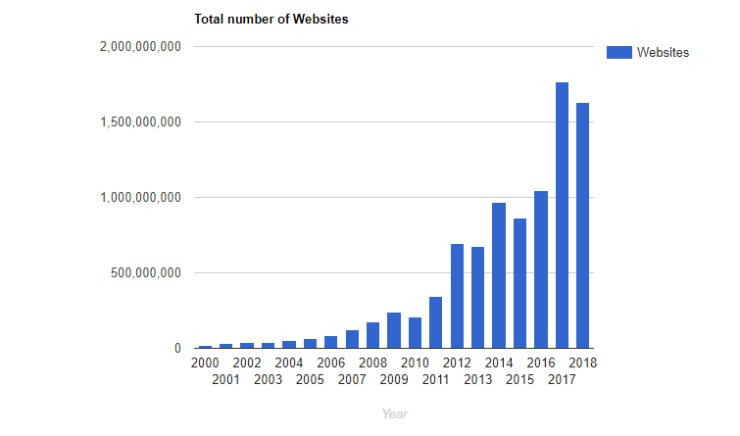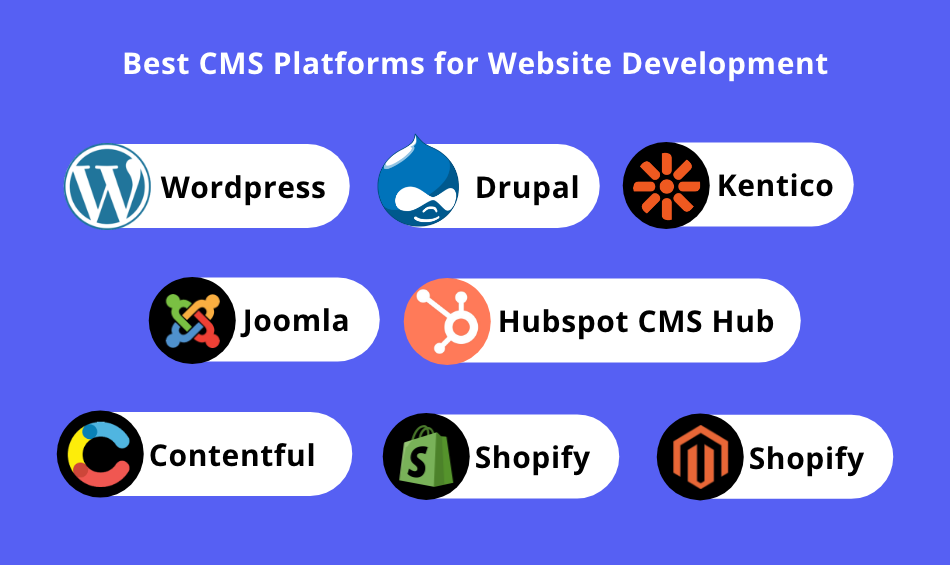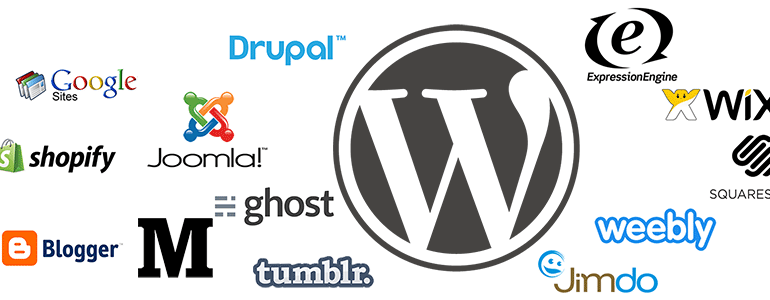The most popular website CMS is WordPress. It powers over 40% of all websites on the internet.
WordPress dominates the CMS market due to its user-friendly interface and vast customization options. It offers thousands of themes and plugins, making it versatile for any type of website. Businesses, bloggers, and e-commerce sites prefer WordPress for its flexibility and extensive support community.
The platform is also SEO-friendly, ensuring better search engine rankings. Regular updates and security features keep websites safe from vulnerabilities. Whether you are a beginner or an experienced developer, WordPress provides the tools needed to build and maintain a professional website. Its widespread use and continuous improvement make it the top choice in the CMS landscape.
Introduction To Cms Popularity
Understanding the popularity of Content Management Systems (CMS) helps in making informed choices. Many websites use CMS to manage their content. Knowing which CMS is popular can guide you in selecting the best one.
Defining Cms
A Content Management System (CMS) is a software that helps manage digital content. It allows users to create, edit, and publish content without coding knowledge. Popular CMS platforms include WordPress, Joomla, and Drupal.
Importance Of Popularity
The popularity of a CMS shows its reliability and user-friendliness. Popular CMS platforms have large communities. They offer abundant resources and support. This makes it easier to find help and tutorials.
| CMS Platform | Popularity | Community Support |
|---|---|---|
| WordPress | Very High | Excellent |
| Joomla | High | Good |
| Drupal | Moderate | Good |
- WordPress powers over 40% of websites.
- Joomla is known for its flexibility.
- Drupal offers robust security features.
Choosing a popular CMS can save time and effort. It ensures you have access to many plugins and themes.

Criteria For Popularity
What makes a website popular in the CMS world? Several factors come into play. Understanding these criteria helps determine the best CMS platforms. This section explores the key elements of popularity.
User Base
The size and engagement of the user base matter. A large, active user base often indicates a successful CMS. Popular CMS platforms have millions of users globally. This widespread adoption ensures a robust community for support and development. Examples include WordPress with its vast community and Joomla with its dedicated users.
Functionality
Functionality refers to the features and capabilities a CMS offers. A popular CMS provides extensive features out of the box. It supports plugins and extensions for additional functionalities. This flexibility allows users to create various website types. For instance, WordPress supports e-commerce, blogs, and forums through plugins.
| CMS | Core Features | Plugin Support |
|---|---|---|
| WordPress | SEO tools, media management, custom themes | Yes |
| Joomla | User management, multilingual support | Yes |
| Drupal | Content types, advanced taxonomy | Yes |
Ease Of Use
Ease of use is crucial for CMS popularity. A user-friendly interface attracts more users. Popular CMS platforms offer intuitive dashboards and simple navigation. They provide easy content management without technical skills. For example, WordPress is known for its easy setup and user-friendly interface.
- Drag-and-drop builders
- WYSIWYG editors
- One-click updates
These features ensure a smooth experience for beginners and experts alike.
Top Cms Platforms
Choosing the right Content Management System (CMS) can make a big difference. Each platform offers unique features and benefits. Here are the top CMS platforms that dominate the web.
WordPress
WordPress is the most popular CMS platform. It powers over 40% of websites. It is user-friendly and flexible. You can create blogs, business sites, and e-commerce stores.
- Easy to use for beginners
- Thousands of free and paid themes
- Plugins for added functionality
WordPress offers a large community for support. It is SEO-friendly and optimized for search engines. It is a top choice for many users worldwide.
Joomla
Joomla is the second most popular CMS. It offers more complexity than WordPress. It is suitable for advanced users and developers.
- Flexible and powerful
- Supports multiple languages
- Built-in SEO features
Joomla has a large collection of extensions. It is great for e-commerce sites and social networks. It requires more technical knowledge than WordPress.
Drupal
Drupal is known for its robustness. It is ideal for large and complex websites. It offers high security and scalability.
- Highly customizable
- Best for developers
- Advanced user management
Drupal has a steep learning curve. It is perfect for big projects and enterprises. It offers numerous modules for added functionalities.
WordPress Dominance
WordPress is the most popular website platform in the world. It powers over 40% of all websites on the internet. This immense popularity is due to its user-friendly interface, flexibility, and vast plugin library. Let’s explore why WordPress holds the top spot.
Market Share
WordPress has a commanding lead in the CMS market.
| CMS | Market Share |
|---|---|
| WordPress | 43.2% |
| Shopify | 4.4% |
| Wix | 2.3% |
These numbers show WordPress’s dominance. No other CMS comes close in market share. This is a testament to its robustness and versatility.
Key Features
- Ease of Use: WordPress is very beginner-friendly.
- Plugins: Thousands of plugins are available to enhance functionality.
- Themes: A wide variety of themes to customize your site’s appearance.
- SEO-Friendly: Built-in features and plugins to help with SEO.
- Community Support: A large community for help and advice.
WordPress makes website building easy and fun. Its features cater to both beginners and advanced users.
Joomla’s Strengths
Joomla is one of the most popular Content Management Systems (CMS). Known for its versatility and robust features, Joomla stands out in the CMS market. Let’s explore some of Joomla’s strengths.
Customizability
Joomla offers extensive customizability. Users can tweak almost every aspect of their website. The system provides a variety of templates and extensions. This enables users to create unique and functional websites.
Additionally, Joomla supports custom coding. This feature is beneficial for advanced users. They can add custom scripts and styles to their site. The platform also allows for multiple languages. This makes Joomla an excellent choice for international websites.
Community Support
Joomla boasts a strong community support. There are numerous forums and groups dedicated to Joomla. These communities are active and helpful. They provide solutions to common problems and share best practices.
Furthermore, Joomla’s official documentation is comprehensive. It covers all aspects of the CMS, from installation to advanced customization. Users can find tutorials, guides, and FAQs. This ensures that both beginners and experts can get the most out of Joomla.
| Feature | Description |
|---|---|
| Custom Templates | Various templates to change the site’s look and feel. |
| Extensions | Additional features to enhance website functionality. |
| Multi-language Support | Build websites in different languages. |
| Community Forums | Active forums for troubleshooting and advice. |
| Official Documentation | Detailed guides and tutorials for all users. |
Drupal’s Flexibility
Drupal is known for its incredible flexibility. It can adapt to many needs. You can build blogs, e-commerce sites, and forums. Its modular system allows for custom functionalities. Drupal suits both small sites and large enterprises.
Scalability
Drupal excels in scalability. It handles high traffic and large content volumes. Even complex websites run smoothly on Drupal. Its caching system boosts performance. You can scale up as your site grows.
Drupal’s architecture supports multiple servers. This ensures your site remains fast and reliable. Large organizations prefer Drupal for its scalability. It can handle millions of users and extensive data.
Security
Drupal is renowned for its security features. It offers robust security measures. Regular updates keep your site safe. The Drupal community actively monitors and fixes vulnerabilities.
Drupal has a dedicated security team. They ensure any issues are addressed promptly. Many government sites use Drupal due to its security. You can trust Drupal to protect your data and users.
Comparing The Top Cms Platforms
Choosing the right CMS can shape your website’s success. Let’s dive into the top CMS platforms. We’ll compare them based on performance, user experience, and cost.
Performance
Performance is critical for any website. A fast site keeps visitors happy.
- WordPress: Known for its speed and flexibility, WordPress performs well. It has numerous plugins to enhance speed.
- Joomla: Offers robust performance with built-in caching. It handles large sites efficiently.
- Drupal: Highly scalable and fast. Ideal for complex sites with heavy traffic.
User Experience
User experience affects how easily you manage your website.
- WordPress: Very user-friendly. Even beginners can navigate and manage content.
- Joomla: More complex than WordPress. It offers flexibility but has a steeper learning curve.
- Drupal: Best for developers. It requires coding knowledge but offers extensive customization.
Cost
Understanding the cost helps you plan your budget effectively.
| CMS Platform | Initial Cost | Ongoing Costs |
|---|---|---|
| WordPress | Free | Hosting, premium themes, plugins |
| Joomla | Free | Hosting, extensions |
| Drupal | Free | Hosting, modules, development costs |


Frequently Asked Questions
What Is The Most Popular Cms Website?
The most popular CMS website is WordPress. It powers over 40% of all websites. Its user-friendly interface and extensive plugin ecosystem make it a top choice.
Which Cms Is Best For Beginners?
WordPress is best for beginners. It offers a simple interface, extensive tutorials, and numerous plugins. It is easy to set up and manage.
Why Is WordPress So Popular?
WordPress is popular due to its flexibility, ease of use, and large community support. It offers numerous plugins and themes for customization.
How Secure Is WordPress Compared To Other Cms?
WordPress is secure when regularly updated. Using reliable plugins and themes, and following best security practices, enhances its security.
Conclusion
Choosing the most popular CMS website depends on your specific needs. WordPress remains a top choice for many users. Its flexibility and extensive plugin library make it unbeatable. Joomla and Drupal also offer strong features. Evaluate your requirements to select the best CMS for your website.
